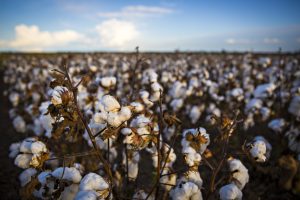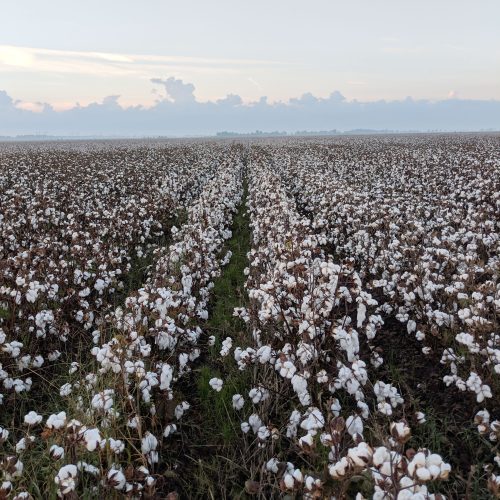This story also appears in our University of Missouri College of Agriculture, Food and Natural Resources’ Agricultural Research Center Magazine. Stop by your local Research Center to pick up a copy! You can view the magazine online by clicking here: Road to Discovery.
Selection of varieties that best fit a farmer’s production goals and challenges is an essential part of profitable grain crop production. The Fisher Delta Research Center provides reliable, unbiased, up-to-date information that makes that selection possible.
The selection of varieties is incredibly important for the Center’s cotton research. Of the 20 states that reported planting upland cotton acres in 2018 to the Farm Service Agency, Missouri ranked ninth with more than 320,000 acres. The majority of those acres are planted in four counties in the Bootheel region, where Fisher Delta is located.
The Center’s go-to research scientist for cotton is Calvin Meeks, who joined the team at Fisher Delta in 2018. Meeks came from Georgia, a state that grows more than a million acres of cotton.

and challenges is an essential part of profitable grain crop
production. The Fisher Delta Research Center provides reliable, unbiased, up-to-date information that makes that selection possible. The selection of varieties is incredibly important for the Center’s cotton research. Of the 20 states that reported planting upland
cotton acres in 2018 to the Farm Service Agency, Missouri ranked
ninth with more than 320,000 acres. The majority of those acres are planted in four counties in the Bootheel region, where Fisher Delta is located.
“Cotton is a unique crop that you’re managing as an annual plant, but it’s actually a perennial plant,” Meeks said. “It’s honestly more of a tree than other crops. Missouri is an interesting state in terms of cotton production as well. The plant thinks it has all of the time in the world, but it gets cold enough in Missouri to kill it.”
Meeks said their cotton planting generally begins during the last week of April, weather permitting. They continue those plantings into the month of May, and can extend into June depending on certain factors.
“There are some difficulties with planting in Missouri that you don’t get further south, like Georgia, for example,” Meeks said. “The plant dates are closer together in Missouri.”
The cotton at Fisher Delta is harvested in September and October.
“Ideally, cotton does like to have a bit of sun,” Meeks said. “The perfect conditions are around 85 degrees during the day and 60 degrees at night. Cotton is a more drought-tolerant plant. It doesn’t need a ton of water, except when it’s blooming and setting bolls. You obviously need some water to get the seed to germinate and get out of the ground, but after that, if it doesn’t rain for a couple weeks, it’s fine.”
The Fisher Delta Research Center plants numerous varieties across several locations each year. The Center does variety testing trials and small plot trials to gather as much yield data as possible. Fisher Delta works with various seed companies to test the varieties. Those companies generally pay a fee and Fisher Delta tests the varieties that the company chooses.
“The seed companies are extremely supportive of our program,” Meeks said. “They wanted unbiased information. If it’s coming from the University of Missouri, it’s unbiased.
“We’re doing our best to provide information for farmers so that they can make the best decisions for their farm. When it comes time for them to decide of which seed they’ll use, they can use our data to help them with the process.”
The Center works with the state cotton board and local farmers on variety testing as well. Fisher Delta reaches out to interested farmers and has them plant varieties on their land.
“We have at least a small plot that has all of the varieties we’re testing in it,” Meeks said. “We have two or three strip trials, as well as large plot, all-farm studies. We also plant plots on farms of our producers. Those who are a part of that partnership manage the crop as they see fit. We don’t get involved.”

Meeks said the cotton crop is in a state of change, currently. He said it was difficult to even find seed in 2019.
“We got a lot of rain in 2018, so there was a lot of seed with low germination,” Meeks said. “It made the seed supplies very tight. Individuals are also growing more cotton, as the acreage has increased. That means there isn’t as much seed to go around.”
Along with the Center’s continued variety trial research, Meeks is conducting separate studies related to irrigation. The research is focused on using sensors to trigger
irrigation, with the goal of making sure the correct amount of water is being used in regards to the plant.
“If you overwater cotton, it will get rank and will try to grow out of producing bolls,” Meeks said. “There will be more vegetative growth instead of reproductive growth. It’s important to know that you’re not overwatering or underwatering the plant.”
Meeks is looking at different sensor options. The sensors he is using at Fisher Delta are quite expensive, so he’s looking at lower-cost solutions.
“We want the farmer to have some options,” Meeks said. “While there are sensors out there that cost a lot of money, we want to find some low-cost solutions to the issue as well.”
As Meeks learns more about cotton in Missouri, he is focused on bringing more varieties to the Center. He wants farmers to know their options.
“There really isn’t much cotton grown north of us, so it’s really hard for farmers to get data to make variety selections anywhere else,” Meeks said. “It’s critical that we do this research at the Fisher Delta Research Center. We’re happy to help with any questions that producers have and we’re excited to continue with the research taking place here.”